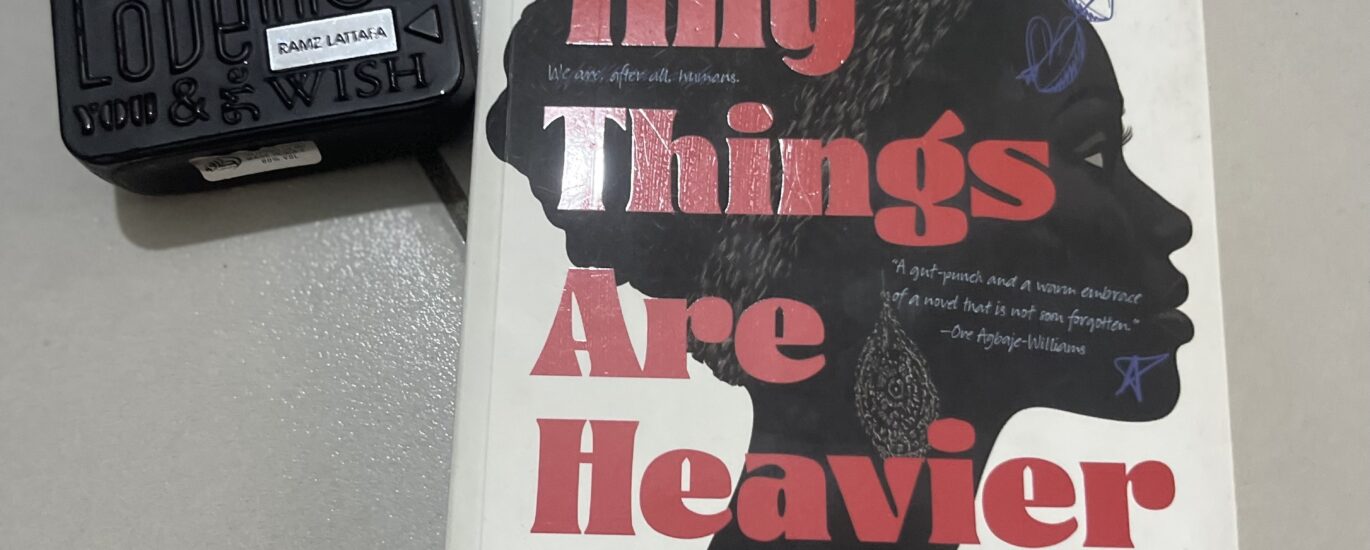
Okonkwo’s The Tiny Things Are Heavier is a carefully written trip through person-making. Using the protagonist, Somkele (Sommy), alongside her brother, Mezie, and her African-American lover, Bryan, Esther Okonkwo typifies what it means to hobble between identities.
Sommy moves abroad a few weeks after Mezie attempts suicide. His attempt splits them apart, widening the reticence between them, making Sommy scramble and worry for a response or acknowledgement from him. It is here that Okonkwo’s prose shines in its capacity for interiority. Readers see Sommy experience intense emotions—forlornness in a new culture, distance from home, and negotiating who she is between what she sees in her American community and her Nigerian background.
Sommy is a blank canvas, unsure of what to say or do. So, she lets the people around her decide:
‘She wants, too, to reference Russian writers as though she’s read them all her life…So she starts to raise her hand in all her classes, especially in the theory class. She picks up the gestures of the smart, speaking fast and with a pinched expression. She makes passionate hand movements–she read somewhere that it creates the appearance of intelligence, in the same way that a pair of glasses does. She learns to always quote a different theorist, whether or not their purported theory relates to the discussion at hand, and to make sure to start every contribution with “It’s interesting how,” or “What I found interesting is,”’
She obsesses over outfits and what to say to be taken seriously, and on and on goes this definition of self propelled by what the world expects or hopes to see in someone like her. Finally, she turns to masturbation, then sex, to numb her personlessness.
The Tiny Things Are Heavier does not shy from intimacy. Every scene is presented starkly as the desire that propels it. There is a delicious primality to them, previously unseen in Nigerian fiction of the last decade. Unlike those who’ve come before her, Okonkwo refuses to wrap sex in flowery metaphors:
‘They fuck frantically. On the bed. On the carpet. He fucks her like he wants to take what’s been denied him…Harder thrusts. Louder pants. He wraps his fingers around her neck, a little more pressure than usual…Now she doesn’t want to stop, and she tells him, croaking,’
Here, desire isn’t something to obfuscate or dress in palatable language. Instead, it is presented in its stark messiness, as it often is in human interactions.
Sommy’s navigation and definition of self straddles two things—her class’s expectations & her family’s. These two forces excavate her into formlessness, till she’s left drifting, wondering what it is that she really wants. This thread continues in the lives of Bryan and Mezie, each man questioning who they are in the face of disappointment and thwarted expectations. Here, Okonkwo attempts an unearthing of masculinity, its performance across cultures. Mezie retreats inward, blaming everyone and everything for his ‘misfortune’. It is now responsible for resenting his younger sister, Sommy, for living the life that’s ‘his’. It becomes his excuse for stringing two women along and expecting the family’s complicity in his deceit. Bryan, on the other hand, retreats into theories, making academic knowledge a prism to explain reality or come to terms with it. In the end, the former continues living without addressing his feelings while the latter relies on his art for closure. Still, Mezie’s situation begs the question, ‘Is his performative stoicness a byproduct of his refusal to acknowledge that he needs help?’
The relationships between the characters here are delivered without filter, particularly the dynamics of a Nigerian household—from the overwhelming need to impress neighbours to the normalised dysfunction in Nigeria’s security and absent emergency system. Here, readers face the unfair incongruity that an air conditioner is fair payment for a human life. The terse relations between Sommy and her family also revisit the familiar expectation that families in her culture are ruled by the unspoken; for example, Mezie’s duplicity is effectively ignored by everyone.
Sommy’s mother snags at everyone she believes is unfitting or unworthy of her abroad-educated daughter. Her propensity for judgement is responsible for Sommy’s distancing herself from the family and refusal to take her seriously. After Bryan and Sommy return from Amawbia, she says to Sommy, ‘If you people are thinking of having kids, this is something you must consider. I know that illnesses like these–dementia, okwia?– can be passed down to kids. The following describes Sommy’s opinion,
‘Sommy takes the phone away from her ear as her mother goes on about how her advice is for Sommy’s good. When her mother is this way, stoic and cruel, she shuts her out. It is a reality so discombobulating…that absorbing it feels like chewing stone.’ Her mother’s softening when relating with Mezie, her willingness to whitewash his wrongs further cements this brashness as an offshoot of a culture of creating explanations for young men irrespective of their contributions to their predicament.
Mental health, a subject treated with more derision than understanding in Nigeria, is given a nod in Okonkwo’s debut. Mezie, crushed by his deportation, retreats into himself and cuts contact with Sonny, a reminder of what could have been for him. Sommy’s formlessness makes her find kin in Bryan, reeling from the absence of his Igbo father, and growing up in a white majority neighbourhood. Through these three, Okonkwo typifies learning to live after aspirations wither. Mezie becomes antagonistic, Bryan retreats into his art, and Sommy lets people determine what she should be until Nigeria’s dysfunction cracks her and Bryan. In the end, they are forced to answer the question: Who am I really, when I am stripped bare of this? After the Amawbia trip, Bryan begins to redefine himself while Sommy stalls, tries, fails, and forges the courage to create an identity for herself.
Okonkwo’s debut glimmers for its handling of interiority, but holds back in prose and congruity (in a few places). The final altercation between Chisom and Sommy borders on melodrama: ‘For a minute, they stand, silent, staring, both of them now carcasses, having direly devastated each other. Okonkwo’s words are measured, clipped, and not allowed to dissolve into abstractions too often. This restraint distances her book from her style in her short-form pieces. Here, there are few flourishes, only crisp prose.
In the end, The Tiny Things Are Heavier is about people, warped, ugly, kind, loving, cruel, and how they choose to handle the hand life deals them. Essentially, it seems to echo the author’s thought: ‘If a person has created a story that makes their pain fathomable, who are [you] to pull it apart?’

Chideraa Ike-Akaenyi is a storyteller and editor. Her works, featured in Ubwali, Communa, Agbowo, Kreative Diadem, Itanile, and Ngigareview, explore adult enuresis, grief as a catalyst for self-ideation, and the complexities of revenge as a form of healing. She won the 2024 Communa Prize for Fiction and was a two-time finalist for the Awele Creative Trust Award (2021 & 2023). In addition to her writing, she serves as a data insights editor at Veriv Africa and an editor for Isele Magazine. She also dedicates time to mentoring young writers through the SprinNG Writing Fellowship. She is an alum of the 2023 E.I. Okonkwo and 2024 Ubwali workshops.





